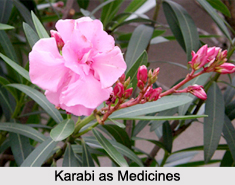 Two varieties of Karabi are described in the Bhavaprakasa, namely white and red flowered. The properties of both are identical, their roots being regarded as poisonous when taken internally and useful in skin diseases and inflammatory affections. The Nerium odorum has several synonyms in Sanskrit signifying horse-killer. It would seem from this, that the poisonous roots were used for destroying horses.
Two varieties of Karabi are described in the Bhavaprakasa, namely white and red flowered. The properties of both are identical, their roots being regarded as poisonous when taken internally and useful in skin diseases and inflammatory affections. The Nerium odorum has several synonyms in Sanskrit signifying horse-killer. It would seem from this, that the poisonous roots were used for destroying horses.
Dose of Karabi in Medicine
Karaviradya Taila: Take sesamum oil 4 seers, decoction of the root of Nerium, odorum 8 seers, cow"s urine 8 seers, Plumbago rosea root and baberang seeds each half a seer in the form of a paste; boil them together and prepare an oil in the usual way. This oil is used in eczema, impetigo and other skin diseases.
The root of Nerium odorum beaten into a paste with water is recommended to be applied to chancres and ulcers on the penis. The fresh juice of the young leaves is poured into the eyes in ophthalmia with Copious Lachrymation.
This article is a stub. You can enrich by adding more information to it. Send your Write Up to content@indianetzone.com
Related Articles
Ayurveda
Origin of Ayurveda
Ayurveda Medication
Elements of Ayurveda
Concepts of Ayurveda
Ancient Literature of Ayurveda
Sushruta Samhita
Classification of Medicine




















